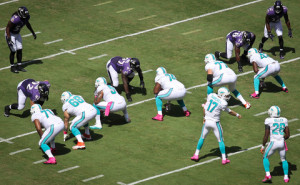The dysfunction in the Miami Dolphins' locker room occurs in a surprising number of workplaces. By now you've surely heard how Richie  Incognito has been accused of bullying teammate Jonathan Martin, and how Incognito and other veterans hazed and bullied other rookies. Their story offers a how-not-to insight for employees and managers everywhere.
Incognito has been accused of bullying teammate Jonathan Martin, and how Incognito and other veterans hazed and bullied other rookies. Their story offers a how-not-to insight for employees and managers everywhere.
Incognito's outrageous emails -- "you half n-----," "you s---," "I want to slap your mother" -- aren't completely surprising. Put a bully in a 320-pound body and you get supersized nastiness. Only the toughest make it in professional football and we expect players to both dish it out and take it on the field -- but on the field and within the rules.
We'll never be rid of Richie Incognitos of the world, but what is especially appalling in this case are the actions of teammates and the organization's total lack of accountability.
It's well-documented that those in positions of authority looked the other way. Not only did Dolphins coaches allegedly encourage veterans to toughen up Martin and other rookies, they allowed that to include routine, systematic bullying and hazing that bankrupted at least one rookie.
According to news reports, when Martin's agent, Rick Smith, complained to Dolphins General Manager Jeff Ireland about bullying, Ireland suggested Martin handle it by standing up to Incognito physically. Great advice, go fight.
Despite the swirling controversy, for more than a week neither coach Joe Philbin nor owner Stephen Ross spoke out against what had happened to Martin and apparently others.
When news reports outed the situation, Incognito lashed out aggressively, tweeting "bring it on" and accusing others of "false speculation" and dragging his "name through the mud with lies," all this despite the documentation of his racist, violent voicemails.
Shockingly, many Dolphins and other football players passionately defended Incognito. Said an offensive tackle, hazing is "all in good fun" and "builds camaraderie." Others blamed it on the victim, who according to media accounts tried to stop the bullying by becoming friends with Incognito and his fellow bullies.
What can someone do to turn around workplace bullying?
Because bullies lack internal brakes, those around them need to act. As NFL network analyst and former pro running back LaDainian Tomlinson acknowledged, "In every locker room there are jerks; we all have them. But at the same time there are always guys that can go and talk to that jerk and say, 'You're going overboard.' "
Instead of sitting on the sidelines when bullying escalates, team leaders must act. Coaches and team captains don't demonstrate accountability to their team by turning a blind eye to what's happening in front of them. Leaders who abdicate responsibility in effect create a power vacuum into which the most controlling, manipulative and negative members step.
Coaches have two duties: to focus on winning and to manage their players. At a minimum, they need to set clear standards of professionalism and conduct (see the classic drama "Remember the Titans"). Although no one expects a pro football locker room to have the tame conversation of a regular office place, Incognito's relentless bullying exceeded even those extraordinary boundaries.
Meanwhile, the rest of us need to reject the idea that we can safely stand by when a bully goes after someone in front of us. Few secrets exist in most workplaces; we all know who the bullies are.
What happens if we don't step to the plate? Those who think the Richie Incognito drama only happened once, in the Miami Dolphins locker room, are playing fantasy football. A Society for Human Resource Management white paper reports that "one out of six individuals report being bullied at some time at work during their careers." According to SHRM's latest survey, bullying in the workplace is three times as prevalent as illegal discrimination and occurs at least 1,600 times as often as workplace violence.
So let's all consider our own answers to these questions: what kind of workplace do we want, and what are we willing to do to make sure we get it?
Latest posts by Lynne Curry, Ph.d., SPHR (see all)
- Holidays: Paying for Parties, Job Searching, & Bonuses - November 29, 2023
- Workplace Conflict: Dueling Employees - July 3, 2023
- You Owe it to Yourself to Blow the Whistle: Washington - June 19, 2023










